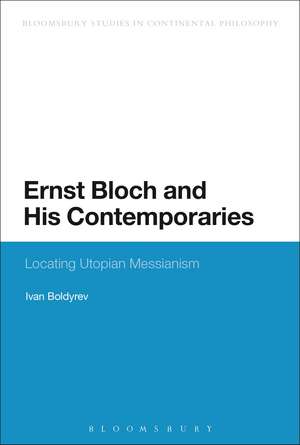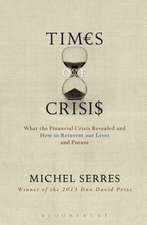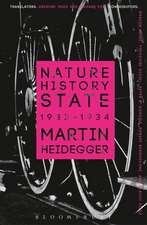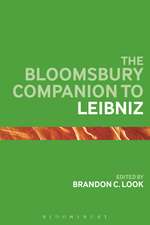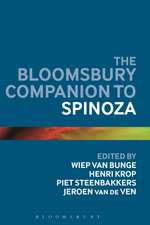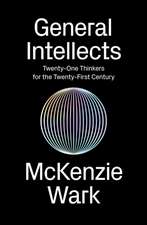Ernst Bloch and His Contemporaries: Locating Utopian Messianism: Bloomsbury Studies in Continental Philosophy
Autor Ivan Boldyreven Limba Engleză Paperback – 26 aug 2015
| Toate formatele și edițiile | Preț | Express |
|---|---|---|
| Paperback (1) | 256.12 lei 6-8 săpt. | |
| Bloomsbury Publishing – 26 aug 2015 | 256.12 lei 6-8 săpt. | |
| Hardback (1) | 772.81 lei 6-8 săpt. | |
| Bloomsbury Publishing – 26 feb 2014 | 772.81 lei 6-8 săpt. |
Din seria Bloomsbury Studies in Continental Philosophy
- 14%
 Preț: 179.26 lei
Preț: 179.26 lei - 23%
 Preț: 179.10 lei
Preț: 179.10 lei - 13%
 Preț: 238.22 lei
Preț: 238.22 lei - 31%
 Preț: 772.98 lei
Preț: 772.98 lei - 30%
 Preț: 773.39 lei
Preț: 773.39 lei - 14%
 Preț: 888.65 lei
Preț: 888.65 lei - 22%
 Preț: 772.98 lei
Preț: 772.98 lei - 13%
 Preț: 258.33 lei
Preț: 258.33 lei - 23%
 Preț: 256.02 lei
Preț: 256.02 lei - 30%
 Preț: 715.00 lei
Preț: 715.00 lei -
 Preț: 255.66 lei
Preț: 255.66 lei - 22%
 Preț: 773.06 lei
Preț: 773.06 lei - 14%
 Preț: 891.10 lei
Preț: 891.10 lei - 30%
 Preț: 774.20 lei
Preț: 774.20 lei - 13%
 Preț: 257.97 lei
Preț: 257.97 lei - 30%
 Preț: 715.00 lei
Preț: 715.00 lei - 22%
 Preț: 774.62 lei
Preț: 774.62 lei - 13%
 Preț: 256.20 lei
Preț: 256.20 lei -
 Preț: 256.59 lei
Preț: 256.59 lei - 22%
 Preț: 257.50 lei
Preț: 257.50 lei - 13%
 Preț: 257.03 lei
Preț: 257.03 lei - 13%
 Preț: 257.68 lei
Preț: 257.68 lei - 13%
 Preț: 258.15 lei
Preț: 258.15 lei - 30%
 Preț: 715.19 lei
Preț: 715.19 lei - 13%
 Preț: 256.49 lei
Preț: 256.49 lei - 22%
 Preț: 891.10 lei
Preț: 891.10 lei -
 Preț: 255.94 lei
Preț: 255.94 lei - 13%
 Preț: 236.45 lei
Preț: 236.45 lei - 30%
 Preț: 714.92 lei
Preț: 714.92 lei - 30%
 Preț: 773.81 lei
Preț: 773.81 lei - 22%
 Preț: 772.98 lei
Preț: 772.98 lei - 22%
 Preț: 889.08 lei
Preț: 889.08 lei - 30%
 Preț: 714.61 lei
Preț: 714.61 lei -
 Preț: 256.59 lei
Preț: 256.59 lei - 14%
 Preț: 772.98 lei
Preț: 772.98 lei - 22%
 Preț: 257.68 lei
Preț: 257.68 lei - 22%
 Preț: 891.75 lei
Preț: 891.75 lei - 30%
 Preț: 773.81 lei
Preț: 773.81 lei
Preț: 256.12 lei
Preț vechi: 294.67 lei
-13% Nou
Puncte Express: 384
Preț estimativ în valută:
49.01€ • 51.17$ • 40.56£
49.01€ • 51.17$ • 40.56£
Carte tipărită la comandă
Livrare economică 05-19 aprilie
Preluare comenzi: 021 569.72.76
Specificații
ISBN-13: 9781474242066
ISBN-10: 1474242065
Pagini: 208
Dimensiuni: 156 x 234 x 25 mm
Greutate: 0.3 kg
Editura: Bloomsbury Publishing
Colecția Bloomsbury Academic
Seria Bloomsbury Studies in Continental Philosophy
Locul publicării:London, United Kingdom
ISBN-10: 1474242065
Pagini: 208
Dimensiuni: 156 x 234 x 25 mm
Greutate: 0.3 kg
Editura: Bloomsbury Publishing
Colecția Bloomsbury Academic
Seria Bloomsbury Studies in Continental Philosophy
Locul publicării:London, United Kingdom
Caracteristici
Outlines Bloch's major legacy - still relevant to European intellectual discourse,social sciences and philosophy
Notă biografică
Ivan Boldyrev is Associate Professor at Higher School of Economics, Russia and Visiting Scholar at Humboldt University, Germany.
Cuprins
Introduction1. Ernst Bloch's Philosophical Prose2. Heidelberg's Apostles: Bloch Reading Lukács Reading Bloch3. Eschatology and Messianism: Bloch with Buber, Landauer, and Rosenzweig4. The Form of the Messianic: Bloch and Benjamin5. The Void of Utopia and the Violence of the System: Bloch contra AdornoConclusion: Drawing the Utopian LineBibliographyIndex
Recenzii
Boldyrev's study will certainly contribute to a new perception of Ernst Bloch. He demonstrates convincingly that Bloch was a creative thinker, who developed his theories in constant dialogue with the most important personalities and ideas of his age.
This book is a welcome addition to the literature ... given the lack of material in English dealing with the complexities of Bloch's early intellectual formation. Boldyrev conveys well the swirling, turbulent thought of Central European intellectuals in the early decades of the twentieth century ... He is a skilful reader of texts and has a fine eye for subtle yet important distinctions ... [A] complex and challenging piece of work, but it is well worth the effort.
This is arguably the most comprehensive English-language study of Bloch's intellectual evolution and his philosophy of utopia. Boldyrev's book is wide-ranging and knowledgeable; it weighs Bloch's originality and significance through sustained comparison with his distinguished contemporaries.
What Ivan Boldyrev has done here is to provide a fresh and accessible perspective not only on Bloch's approaches to the messianic and utopian, but to discuss those approaches in relation to so many other central philosophical figures of the 20th century. What becomes clear in this book is that Bloch's central operator of the Ontology of Not Yet Being brings into its orbit and helps to explain the ideas of Heidegger, Lukács, Benjamin and Adorno and throws into sharp relief some of the contradictions of 20th century thought. This is an excellent little book for those who wish to understand Bloch's place within the universe of German philosophy.
Whereas Freud examined our nightmares, Ernst Bloch focused on our daydreams, our fantasies of alternative realities as the ontological ground of the utopian imagination. In this erudite and compellingly nuanced study, Ivan Boldyrev places Bloch in conversation with his contemporaries - Adorno, Benjamin, Buber, Landauer, Lukács, Rosenzweig, and Scholem - illuminating his and their poetics of messianic hope.
Bloch's work is so unusual as to demand dis-engagement. Boldyrev's juxtaposition with his contemporaries - on times and on mysticism - is helpful; but it is his extended discussion of Bloch's long and fascinating relationship with Lukács that is the centerpiece of this useful book, and casts new light on both theorists.
This book is a welcome addition to the literature ... given the lack of material in English dealing with the complexities of Bloch's early intellectual formation. Boldyrev conveys well the swirling, turbulent thought of Central European intellectuals in the early decades of the twentieth century ... He is a skilful reader of texts and has a fine eye for subtle yet important distinctions ... [A] complex and challenging piece of work, but it is well worth the effort.
This is arguably the most comprehensive English-language study of Bloch's intellectual evolution and his philosophy of utopia. Boldyrev's book is wide-ranging and knowledgeable; it weighs Bloch's originality and significance through sustained comparison with his distinguished contemporaries.
What Ivan Boldyrev has done here is to provide a fresh and accessible perspective not only on Bloch's approaches to the messianic and utopian, but to discuss those approaches in relation to so many other central philosophical figures of the 20th century. What becomes clear in this book is that Bloch's central operator of the Ontology of Not Yet Being brings into its orbit and helps to explain the ideas of Heidegger, Lukács, Benjamin and Adorno and throws into sharp relief some of the contradictions of 20th century thought. This is an excellent little book for those who wish to understand Bloch's place within the universe of German philosophy.
Whereas Freud examined our nightmares, Ernst Bloch focused on our daydreams, our fantasies of alternative realities as the ontological ground of the utopian imagination. In this erudite and compellingly nuanced study, Ivan Boldyrev places Bloch in conversation with his contemporaries - Adorno, Benjamin, Buber, Landauer, Lukács, Rosenzweig, and Scholem - illuminating his and their poetics of messianic hope.
Bloch's work is so unusual as to demand dis-engagement. Boldyrev's juxtaposition with his contemporaries - on times and on mysticism - is helpful; but it is his extended discussion of Bloch's long and fascinating relationship with Lukács that is the centerpiece of this useful book, and casts new light on both theorists.
